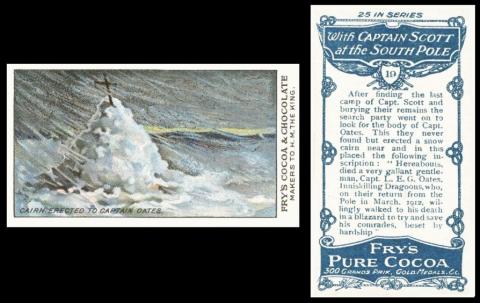
Our third clue celebrated the bravery of Captain Lawrence Oates, the man who walked out into the blizzard so as to try and save the lives of his fellow men. In the end none of them survived. This is a lovely set, and I much prefer it to John Player`s "Polar Exploration" (1915).
There is something curious about this set though. It was issued in 1912, but if you look at the cards, the story jumps about a bit, and this is especially noticeable as far as cards 19 and 21, which show the discovery of the tent, and the cairn which was erected over the bodies, still beneath that tent. After that, the story continues with cards of the first year, the ponies, and the reaching of the pole as the final card. To me this suggests that cards 19 and 21 were not originally there, and that the set was intended to end with their success. However, with the loss of the party becoming headline news, did Fry`s perhaps pluck out two cards of lesser importance, and hastily make cards of the discovery and burial ?
This cairn was erected by the search party, led by the surgeon Edward Atkinson, in November 1912. That is pretty close to the decision to issue this set, though there is the sense that they were hoping maybe someone would be found alive - and they were not. As it says on this card, the bodies of Scott, Wilson, and Bowers were actually found by the search party, but were not brought back. The intention was to do so, and another cairn was built by or maybe over them as a marker; however there was no trace of the cairn when a party did return.
The body of Captain Oates was never found - nor was that of fellow explorer Edgar Evans, who had died in February, of a head injury, after a fall.
Our British Trade Index part I, (RB.25, printed in 1962), covers all known non-tobacco cards that were issued before 1945. This set falls under section 1 of the Fry listing, "issues 1908 - 1917" and is described as :
WITH CAPTAIN SCOTT AT THE SOUTH POLE. Sm. 65 x 36. Nd. (25) ... FRY-18
A similar description appears in our updated volume but usefully inserts the date, 1913, in place of the word "Sm." - and it recodes the set as FRY-430.
